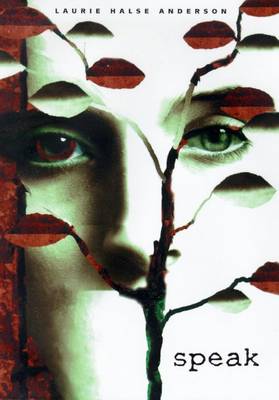Reviewed by Jo on
I first heard about Speak by Laurie Halse Anderson a long time ago, but due to it's subject matter, I never picked it up. Back then, rape was a subject I tried to stay away from in my reading. But when Speak was challenged in 2010 I bought a copy in support (FYI, it was challenged yet again in 2013). Still, it has taken me until now to read it, mostly because of the subject matter, partly because I had so many other books. However, having read Easy by Tammara Webber in 2013 and Asking For It by Louise O'Neill just recently, I knew I was now capable of reading about rape. Though now I'm thinking it probably would have been better for me to have read it before.
Melinda called the police on a summer party she was attending in August. Now she's starting her first year of high school and no-one wants to know her. Her friends have turned their back on her, and she's a social outcast. But no-one knows why she really called the cops, no-one knows what happened, and the more time goes on, the more she retreats from the world. Her grades are falling, she bunks classes, and she finds it harder and harder to speak. Because what happened to Melinda that night, at that party, is unimaginable, unthinkable, unspeakable.
Speak was first published in 1999, when I was 12, and apart from the odd Judy Blume novel, I didn't really read YA until I was at uni for one of my modules. However, I think Speak would have been best suited for me back then, despite steering clear from books featuring rape for a really long time. Speak is very much of its time, and times have moved on. I don't really like comparing books, but I think it's necessary here; Speak doesn't come close to books like Easy and Asking For It. Although Speak doesn't hide from the truth, it's not as in your face as books being released today. If you don't know what the book is about before you read it, you don't really know what happened until over half way through, there are only hints beforehand. Melinda is keeping quiet, trying to forget, and make it through each day.
If Speak wasn't about Melinda's rape, I know it would be a completely different story, I know that. I know what happened to Melinda affects her throughout the story. But I found it very hard to sympathise with Melinda. This isn't because I didn't like her; I didn't feel much of anything about her. I just didn't really care about her as a person. And with all the time she's not speaking, well, not a huge amount happens, really. The school year goes on, she plods through each day... nothing major happens until it does, quite a way into the book. I just wasn't really engaged in this story, I'm really sad to say. I just wasn't affected by this story, and that really troubles me - because it's about a girl who's been raped, I should be affected.
Part of me thinks that maybe I'm just too old for this book, or it's because it doesn't come close to the novels we publish today in regards to just how candid they are from the get-go. None of this means it was a bad story, though, it just didn't do it for me. Melinda had her moments of being a little amusing, and from Anderson's poem Listen, it's quite obvious that so many people loved, were deeply affected and helped by Speak. I'd say Speak is a great story to introduce younger teens to the subject of rape in fiction, but I personally much prefer the books we're seeing today.
N.B. You might be interested to know that words such as "retarded" and "spaz" are used in Speak. I don't think such words were as looked down on back when this was published as they are now, but they did make me wince to read them.
Reading updates
- Started reading
- 12 August, 2015: Finished reading
- 12 August, 2015: Reviewed
